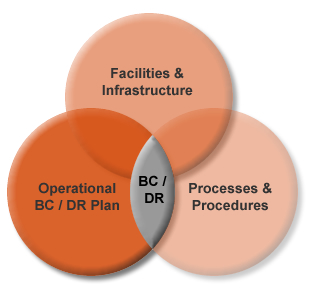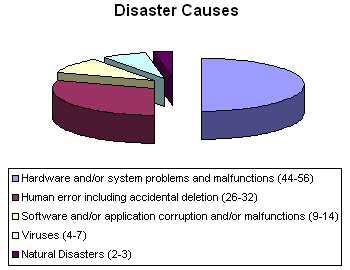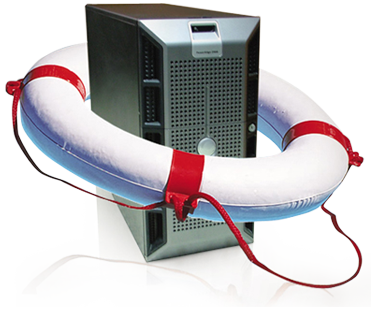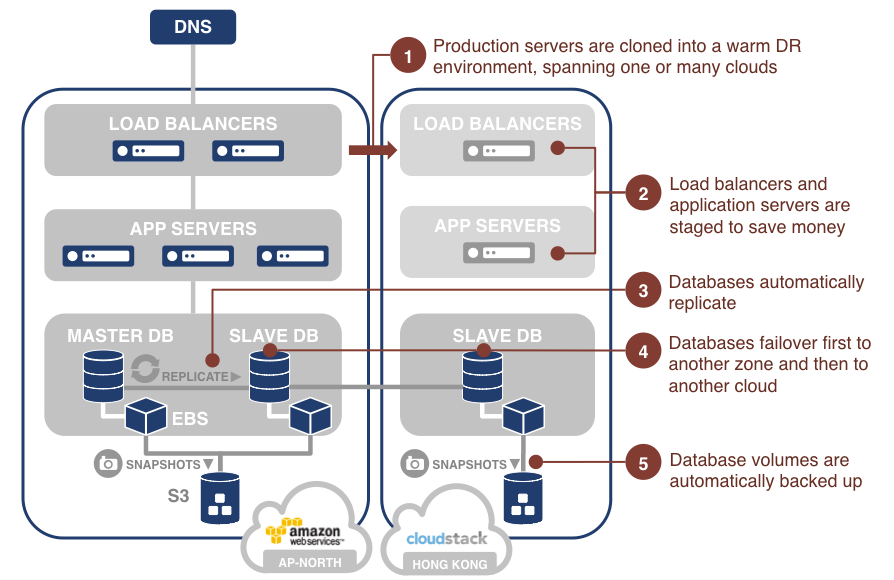Data Recovery Services and Business Continuity
Data Recovery Services and Business Continuity
 Disaster data recovery planning is one of the major parts of business continuity in the digital world. The ability to run both office productivity and enterprise software is critical. Therefore, recovery strategies for information technology should be developed, so technology can be restored in time to meet the needs of the business.
Disaster data recovery planning is one of the major parts of business continuity in the digital world. The ability to run both office productivity and enterprise software is critical. Therefore, recovery strategies for information technology should be developed, so technology can be restored in time to meet the needs of the business.
Disaster recovery and business continuity may include complex steps that require unique methods and thorough knowledge of the operational aspects of various applications and data sets. It is important to consider that there are many interdependencies across servers and databases that need to be restored in the correct sequence. In order to retrieve critical data and get systems back online in the right order, businesses should allocate the time to record and automate the recovery process into a series of steps. Executed correctly, even if the individuals who administrate the applications are no longer available, an organization can be assured that it has created an intelligent and efficient approach to recovery.
In the past, disaster recovery required a major investment in physical infrastructure. Organizations had to weigh the risk of not being ready for a disaster with the cost and level of recovery they could afford. As an effect of this, many business executives perceive traditional disaster recovery as a costly investment that is only accessible to organizations with big budgets.
 Many executives assume that disasters are rare. A study published by The Center for Research on the Epidemiology of Disasters show that natural disasters have
increased by 233% since 1980. Not considering the fact that the rate of disasters is increasing, a wide range of other events can put business continuity at risk, including data corruption, system failure, human error, and datacenter or facility loss.
Many executives assume that disasters are rare. A study published by The Center for Research on the Epidemiology of Disasters show that natural disasters have
increased by 233% since 1980. Not considering the fact that the rate of disasters is increasing, a wide range of other events can put business continuity at risk, including data corruption, system failure, human error, and datacenter or facility loss.
Even with a recovery plan put in place for disasters, a lot of corporations don't fully consider a disaster until it happens. A 2011 report by Forrester stated that as little as 1% of businesses surveyed have tested their backups on a daily basis. The report found that only 12, 19, and 27 percent of corporations performed a review on their recovery systems on a weekly, monthly, quarterly basis respectively. Almost one in five organizations acknowledged that they do not test their disaster plans at all. The survey found that among respondents that say data loss is a major concern, more than 1 in 3 said they didn't know how much the cost of an hour of downtime would be for their business. Over 30 percent valued the cost at thousands of dollars/hour. The most reliable way to insure that a business is up and running again quickly in the event of a data loss and minimize the risk of a devastating financial impact is to supplement a disaster recovery plan with a data recovery service provider.
 Some IT administrators fall back on computer or storage
device manufacturers believing they are the most qualified to retrieve data from their own devices. However, manufacturers' tech support focus on getting hardware running as quickly as possible and in most instances will assume a company has an available backup for important data. While the vendor might know their hardware well, they are generally not experts in data corruption and specialized data recovery methods. For
complex RAID array recoveries, for example, the process may depend on specific proficiency beyond that storage array.
Some IT administrators fall back on computer or storage
device manufacturers believing they are the most qualified to retrieve data from their own devices. However, manufacturers' tech support focus on getting hardware running as quickly as possible and in most instances will assume a company has an available backup for important data. While the vendor might know their hardware well, they are generally not experts in data corruption and specialized data recovery methods. For
complex RAID array recoveries, for example, the process may depend on specific proficiency beyond that storage array.
Unfortunately, backup infrastructure and planning is not failure-proof and can be affected by data loss in the same way current storage systems can. Also, many backups are not done "on the fly", meaning a part of the important data may not have been backed-up in the window when the data loss happened. This part of information may be critical for business itself, not to the mention compliance and regulatory.

With more and more corporations move to virtual backup systems, it is important now, more than ever, to frequently check the integrity of business data as virtualization contracts often claim no liability for deletion, corruption, destruction or loss of data. Therefore, it is crucial for IT managers to be proactive with a data recovery services in their contingency plans.
With the expensive cost of downtime and overwhelming results, data loss is a potentially devastating issue that can affect any enterprise making it a critical area that should not be overlooked. Despite having a variety of methods available to help recover and evaluate data, the safest bet to ensure that the loss is minimal is to be proactive about developing a plan in advance.
